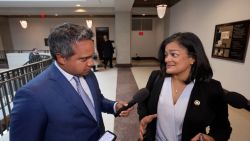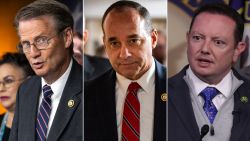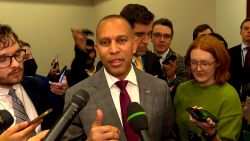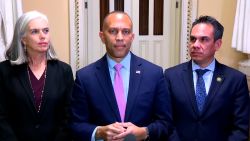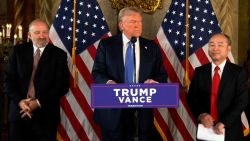America is hours away from a holiday season government shutdown courtesy of Donald Trump and Elon Musk.
Everyone knew the president-elect and his new super-disrupter buddy were going to cause havoc in Washington. But no one thought they’d manage it even before the 47th president is sworn in.
Barring a pre-Christmas legislative miracle, the US government will plunge into a partial shutdown at midnight Friday after Musk tanked a year-end spending deal and the Trump doubled down with a demand for new debt spending authority that he never had a chance of getting through Congress.
House Speaker Mike Johnson’s desperate Plan B on Thursday only succeeded in coming up with a bill that sparked a revolt on the House floor against Trump by 38 Republicans and almost all Democrats.
Two days of chaos on Capitol Hill upended what had appeared to be a calm end to a bitterly ill-tempered 118th United States Congress.
It was a Wednesday social media storm by Musk, who will co-chair an ad-hoc Department of Government Efficiency next year, and the return of Trump’s congressional wrecking ball that turned everything on its head.
“Truly, I don’t know what’s going on,” Maine Republican Sen. Susan Collins said at one point on Thursday as Johnson frantically struggled — and failed — to enact his Plan B.
Johnson had worked for weeks to try to keep the government open. That is now a strategy that threatens his already wobbling speakership since plenty of MAGA Republicans would be happy to see it close, even though that could inconvenience and economically harm many of their working-class voters.
By Thursday evening, his authority was in tatters as furious Republicans turned on one another on the House floor. Democrats suddenly emerged from their post-election funk to warn that the real new power in the land was not Trump but the world’s richest man: “President Musk.”
What the chaos reveals about the Trump administration
The mayhem of the last few days has revealed several key challenges for the incoming Trump administration.
First, the recalcitrance of the House GOP shows that although Trump will be an unusually powerful president when he takes office for the second time, he won’t be omnipotent
Second, this crisis has enlivened a Democratic Party that was despondent and directionless after Vice President Kamala Harris’ defeat. Musk’s backfiring political first move offered the party an opportunity to argue that an unelected multibillionaire with massive vested interests is the real president and not Trump. The idea that billionaires and millionaires are hurting working Americans is a lay-up even a party that lacked a convincing message in the presidential election should be able to manage. And it’s sure to form the bedrock of its message leading into the 2026 midterm elections.
Thirdly, the Capitol Hill farce demonstrated that the president-elect may have created a political monster in his close alliance with Musk, which paid off with millions of dollars in campaign funding but could undermine him once he’s back in the White House.
For MAGA supporters, the idea that Trump and Musk’s end of year train wreck is a failure will be a colossal case of missing the point. After all, the power pair’s appeal lies in their promise to eviscerate Washington.
But despite the anti-government fervor of his base, Trump will need to provide a measure of governance next year if he is to enact his ambitious plans on immigration and taxes. That’s going to be a challenge if Musk is constantly on the brink of tearing everything down.
Trump often undermined the political priorities of his party and administration with a tweet storm in his first term. It would be the ultimate irony if it now keeps happening to him, courtesy of the X platform’s new owner, Musk.
The backup plan that failed
Johnson’s attempt to defuse the crisis with a new bill with a measure that included $100 billion in disaster relief and help for farmers achieved the unique feat of turning both Democrats and Republicans against it.
Some Republican holdouts were furious that the plan included Trump’s sudden demand for a two-year extension of the government’s borrowing authority that was due to expire early next year. One hardline GOP budget hawk, Chip Roy, led a rebellion against the president-elect for the same reasons he opposed such hikes under President Joe Biden — because it did not come with accompanying spending reductions. “I’m not going to vote for another debt limit increase without knowing what the actual cuts will be. That’s a nonstarter,” the Texas Republican said.
The failure to eventually raise the debt ceiling would send the United States into default and would likely set off a domestic and international financial crisis. Republicans in the past have used this prospect to jam Democratic presidents into big legislative concessions. Democrats, therefore, weren’t going to let Trump off the hook.
House Minority Leader Hakeem Jeffries argued that Trump’s demand was an attempt to create room for massive tax cuts that would favor corporations and the wealthiest Americans in the new year that would balloon the deficit. “This bill is designed to set up the GOP tax scam 2.0,” the New York Democrat said.
A fight that Trump didn’t have to start
The impasse augurs ill for Trump’s capacity to govern effectively and enact his agenda, even with a GOP monopoly on Washington power next year. But the amazing thing is that the president-elect had no pressing need to precipitate it.
Johnson’s initial aim was to keep the government open until next year, with a stop gap spending plan — which needed Democratic votes and priorities to pass — to clear the decks for Trump and the new Republican Congress in January.
Such a move would have been painful for Trump and his supporters, but it would be a means to an end.
“The best idea would have been for us to work together to take as much off of Trump’s plate as possible in the first 100 days and the way you do that is you eat a sh*t sandwich,” Rep. Dan Crenshaw, a Texas Republican, said. “And if he would back us up instead of letting his people destroy us online, we would eat the sh*t sandwich for him.”
But the hubris of the president-elect, who’s acting as though he is already the new commander-in-chief, and the involvement of the mercurial Musk led Trump into a treacherous spot.
In some ways, the showdown was set off by the belief among some Republicans that a clear Trump election victory equipped them with unassailable authority to act exactly as they please. Trump’s supporters believe that they have a mandate for slashing reductions in government and huge budget cuts, so it’s hardly surprising they’d balk at a multi-billion dollar spending spree.
And what better way to metaphorically torch Washington institutions — a step many MAGA fans support — than to shut down the government at the first opportunity?
But this is where Musk’s decision to ignite a MAGA firestorm came unstuck and reality intruded.
Any bill to keep government open into next month needs Democratic votes in the House since the GOP majority is too small to overcome party debt hawks who always oppose new spending.
And Democrats — for a few more weeks — still control the Senate and the White House. So there was no way that simply demanding everyone on the Hill bow to Trump and Musk’s demands was going to work. In fact, it was a disastrous tactical error, one that shows that the Tesla mogul, while a genius in his own fields of expertise, has little experience or understanding how Washington really works.
Johnson searches for a last-minute solution
As of Friday morning, Johnson didn’t seem to have a plan “C” even if the traditional whiff of jet fuel ahead of a looming holiday has in the past nurtured Christmas miracles.
It’s just possible to imagine a solution that could see the debt ceiling provision removed from the bill, leaving more than $100 billion in disaster aid, plus aid for farmers, that might be able to squeeze through with Democratic House votes.
But that would require Trump to back down on his debt ceiling demand — meaning he’d suffer a huge and public legislative defeat even before becoming president again. And if Johnson tried to move the bill in such a manner, with Democratic votes, he might deal the final blow to his own speakership.
This means that there’s a very realistic threat of a government shutdown spanning the holiday season and stretching into the next Congress in January when Republicans will control both chambers.
This is a risk for Trump, since it would mean the new era of GOP control would begin in a crisis with no guarantee that a divided House with a reduced GOP majority could quickly pass a funding bill to reopen the government.
Anti-government Republicans may not worry too much about federal workers being furloughed or those employees who are deemed essential working without pay.
But disruption quickly spreads throughout the country — airport security can be slowed, for example, and national parks get closed down. The inevitable stories of military personnel working without pay would heap pressure on the GOP and create exactly the wrong public perception at the start of a new presidency.
In the event of a shutdown, the best scenario for the GOP in the new Congress would be to fold a new funding bill into a budget that would enact large spending cuts demanded by grassroots Republicans and put it on Trump’s desk once he is sworn in as president.
But that assumes a level of Republican unity that has never been obvious in the Trump era. And right now, it looks like the House might struggle to fulfill its most basic initial duty — electing a new speaker.







